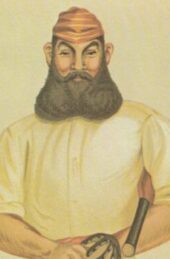Within the pages of my latest book, set in the gritty backdrop of 1860s Melbourne, The Case of the Wandering Corpse, a thrilling tale unfolds as my protagonists Findo Gask and Erroll Rait confront an elusive organization known as Die Broederskap (The Broederbond). This clandestine organisation, the name itself translating to “The Brotherhood,” is formed by white South African immigrants. While Die Broederskap may seem like a fictional creation, it bears a striking resemblance to an actual secret society that had a profound impact on the development of South Africa.
The history of Afrikaner settlement in South Africa is a saga of adventure and struggle. It began when Dutch, French Huguenot, and German settlers, collectively known as the Boers or Afrikaners, sought refuge in the far reaches of southern Africa. These pioneers established independent farming communities, most notably the Cape Colony, which was initially founded by the Dutch East India Company in 1652.
However, their journey was fraught with tension, clashes with British colonial authorities, and conflicts with indigenous peoples like the Xhosa. These challenges eventually led to the Great Trek of the 1830s and 1840s, during which Afrikaner settlers moved inland to escape British rule. This movement gave birth to their own republics, including the Orange Free State and the Transvaal.
The discovery of gold in the Transvaal and the aggressive actions of Cecil Rhodes in asserting British claims triggered the Boer War, fostering a strong sense of Afrikaner identity and ultimately leading to the formation of South Africa as a nation. While Afrikaner resilience in facing British aggression was admirable, this society also had its dark side, with deep-seated issues rooted in cultural preservation, rigid ideologies, and the perpetuation of racial divisions. Like most, if not all, theocracies, progress was also constrained leading to, for one example, the banning of television.
The first proposal to introduce television was made in 1953, but this was rejected by the National Party government. Even though the state-controlled South African Broadcasting Corporation had a virtual monopoly on radio broadcasting, Afrikaners saw the new medium as a threat to their domination with the widespread availability of English language programming (certainly an accurate assessment). Consequently, when man first walked on the moon, South Africans had to watch cinema newsreels to see Neil Armstrong’s famous first steps.
While many may be unfamiliar with the name “De Broederbond”, this secretive and influential organization played a pivotal role in South Africa’s history. The Afrikaner Broederbond, often simply referred to as the Broederbond, was a covert, male-only society dominated by Afrikaners. For decades, it held extraordinary sway over South Africa’s political, social, and economic landscape.
Founded in 1918 in the aftermath of World War I and the Spanish flu pandemic, the Broederbond emerged during a time when Afrikaners felt marginalized culturally and politically. This clandestine organization was established with the purpose of advancing Afrikaner interests, employing a shroud of secrecy that extended to the core of their activities.
The Broederbond was enigmatic, with a core mission to secure and promote the cultural, political, and economic interests of the Afrikaner community. Its members engaged in various covert activities, including political infiltration, economic empowerment, cultural preservation, media manipulation, and influence within social and religious circles.
The impact of the Broederbond on South Africa’s history was profound, particularly during the apartheid era. Their influence extended into every facet of South African life, actively shaping the implementation of apartheid policies that institutionalized racial segregation and discrimination. These policies resulted in gross human rights violations and drew widespread international condemnation.
As a consequence of the Broederbond’s efforts, Afrikaners gained significant economic dominance, furthering racial and class divides. Their promotion of Afrikaner culture was relentless, often at the expense of other cultures and languages within South Africa.
The Broederbond’s influence reached the upper echelons of government, with many of its members occupying key political positions. This allowed them to mould policies and decisions to favour Afrikaner interests, intensifying divisions within South Africa’s diverse population and provoking social unrest, violence, and global condemnation.
With the dawn of the 1990s and the transition to a democratic South Africa, the Broederbond’s influence began to wane. Faced with increased scrutiny and criticism for their role in apartheid-era atrocities, the secretive nature of the organization became increasingly untenable in the new political climate. Many members distanced themselves, leading to the eventual dissolution of the Broederbond in the late 1990s.
The Broederbond’s legacy, a shadowy and contentious one, remains inextricably linked to the darkest chapters of South African history. In my novel, Die Broederskap mirrors the Broederbond, albeit with a more overtly criminal twist – almost akin to a South African Mafia. The reach of such theocratic secret societies, as with Die Broederskap, inevitably poses challenges to society.
The question remains: Will Findo and Erroll manage to escape their tenacious grip?
David Cairns is the author of The Helots’ Tale series, and his latest novel is The Case of the Wandering Corpse.







